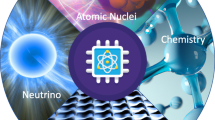Abstract:
Magic-angle spinning (MAS) solid state nuclear magnetic resonance (NMR) spectroscopy is shown to be a promising technique for implementing quantum computing. The theory underlying the principles of quantum computing with nuclear spin systems undergoing MAS is formulated in the framework of formalized quantum Floquet theory. The procedures for realizing state labeling, state transformation and coherence selection in Floquet space are given. It suggests that by this method, the largest number of qubits can easily surpass that achievable with other techniques. Unlike other modalities proposed for quantum computing, this method enables one to adjust the dimension of the working state space, meaning the number of qubits can be readily varied. The universality of quantum computing in Floquet space with solid state NMR is discussed and a demonstrative experimental implementation of Grover's search is given.
Similar content being viewed by others
Author information
Authors and Affiliations
Additional information
Received 19 April 2001
Rights and permissions
About this article
Cite this article
Ding, S., McDowell, C., Ye, C. et al. Quantum computation based on magic-angle-spinning solid state nuclear magnetic resonance spectroscopy. Eur. Phys. J. B 24, 23–35 (2001). https://doi.org/10.1007/s100510170018
Issue Date:
DOI: https://doi.org/10.1007/s100510170018




